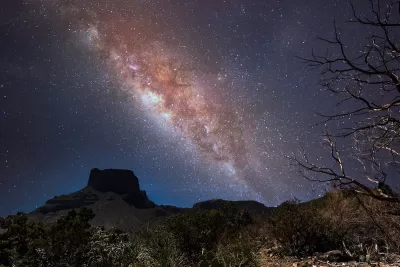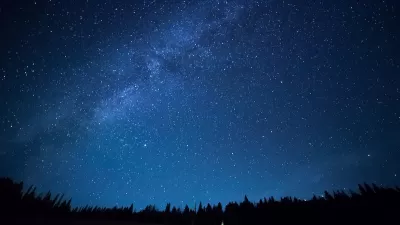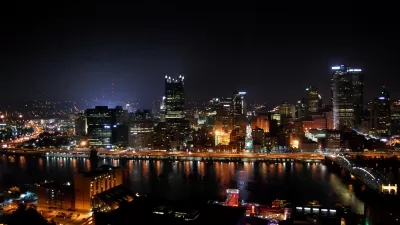Limiting light pollution can have beneficial effects for humans, animals, and the local economy.

Writing in Smart Cities Dive, Kalena Thomhave describes the efforts being made by three communities to protect their night skies and become certified Dark Sky Communities.
Earning the certification from DarkSky International can take years. Cities dedicated to the process, however, say it comes with a slew of benefits: They see not only the stars but also reduced energy consumption, lower electricity bills, healthier residents, improved environmental protection, increased ecotourism and even safer streets.
The certification program offers resources and information on the types of retrofits cities and towns can make to reduce light pollution while maintaining safety and security. Limiting glare can have benefits for people on the road, too. “Pedestrians and drivers on the road are less likely to be temporarily blinded by a bright light if it’s directed toward the ground properly.”
The three communities profiled in the article range from Bee Cave in the Texas Hill Country to a lakeside Indiana town and a Nevada city that hopes to boost ‘astrotourism’ to the area by keeping its nighttime conditions optimal for stargazing.
FULL STORY: 3 communities turning to the dark side with dark-sky retrofits

Maui's Vacation Rental Debate Turns Ugly
Verbal attacks, misinformation campaigns and fistfights plague a high-stakes debate to convert thousands of vacation rentals into long-term housing.

Planetizen Federal Action Tracker
A weekly monitor of how Trump’s orders and actions are impacting planners and planning in America.

San Francisco Suspends Traffic Calming Amidst Record Deaths
Citing “a challenging fiscal landscape,” the city will cease the program on the heels of 42 traffic deaths, including 24 pedestrians.

Defunct Pittsburgh Power Plant to Become Residential Tower
A decommissioned steam heat plant will be redeveloped into almost 100 affordable housing units.

Trump Prompts Restructuring of Transportation Research Board in “Unprecedented Overreach”
The TRB has eliminated more than half of its committees including those focused on climate, equity, and cities.

Amtrak Rolls Out New Orleans to Alabama “Mardi Gras” Train
The new service will operate morning and evening departures between Mobile and New Orleans.
Urban Design for Planners 1: Software Tools
This six-course series explores essential urban design concepts using open source software and equips planners with the tools they need to participate fully in the urban design process.
Planning for Universal Design
Learn the tools for implementing Universal Design in planning regulations.
Heyer Gruel & Associates PA
JM Goldson LLC
Custer County Colorado
City of Camden Redevelopment Agency
City of Astoria
Transportation Research & Education Center (TREC) at Portland State University
Jefferson Parish Government
Camden Redevelopment Agency
City of Claremont




























